Centre for Policy Development's Blog, page 7
September 5, 2023
MEDIA RELEASE: Climate transition and green industry will deepen Australia’s links to South-East Asia
Tuesday 5 September 2023 – The transition to net zero carbon emissions is both the most significant challenge facing our region, and a major opportunity for Australia’s economic relations with South-East Asia, according to the Federal Government’s South-East Asia Economic Strategy to 2040, released today.
The strategy, written by South-East Asia special envoy former Macquarie Bank CEO Nicholas Moore, recommends boosting key projects in the battery, electric vehicle and solar sectors. It also recommends clean energy science and technology partnerships, a regional market for low-energy electricity, standard climate disclosure rules and education qualifications for the South-East Asian Market.
“Australian and Southeast Asian companies will have major opportunities to partner in solar, battery storage and electric vehicle supply chains,” the report said.
In the area of batteries, the report went on to say that “There will be opportunities for Australian companies to move up the battery value chain and supply high-value battery material exports”.
However the report warned that capitalising on opportunities is contingent on “clearing blockages”, identifying policy/regulatory uncertainty, construction risk, data and limited knowledge among investors of regional energy markets as clear barriers.
The report was released as Prime Minister Anthony Albanese and Foreign Minister Penny Wong prepare to travel to Jakarta for the ASEAN leadership summit and East Asia forum. West Australian Premier Roger Cook also led a contingent of mining executives to the summit to explore critical mineral export opportunities.
It comes as the USA, Canada, Japan, Korea, China, the EU and the UK signal major public investment in green industry capability, as nations compete to secure territory in the post-carbon global economic order.
Centre for Policy Development CEO Andrew Hudson said that the report was an important guiding document for Australian economic and foreign policy over the coming decades, and illustrated the importance of problem-solving efforts such as the Australia-Indonesia Energy Transition Policy Dialogue.
“This report shows Australia can build deeper, more beneficial economic relationships with our closest neighbours in the Indo-Pacific region by pursuing the opportunities created by the global clean energy transition,” Mr Hudson said.
“Australia is well-positioned to pursue these opportunities. We have abundant critical minerals like lithium. Our workforce is highly skilled. Our education system and research and development capability are second-to-none. Our fund managers are eager to invest with confidence in long-term opportunities.
“The Prime Minister’s visit is an important opportunity to negotiate for new opportunities, industries and projects with our neighbours that can support decades of Australian prosperity, partnership and influence in the region.
“It is clear that there are challenges to overcome. This is a mission that our region can and must pursue if we are to capture economic benefits from green industry, decarbonise our economies, and build better living standards in Australia and across the Indo-Pacific in the post-carbon global economy.”
ENDS
The post MEDIA RELEASE: Climate transition and green industry will deepen Australia’s links to South-East Asia appeared first on Centre for Policy Development.
August 29, 2023
ASEAN Energy Business Forum
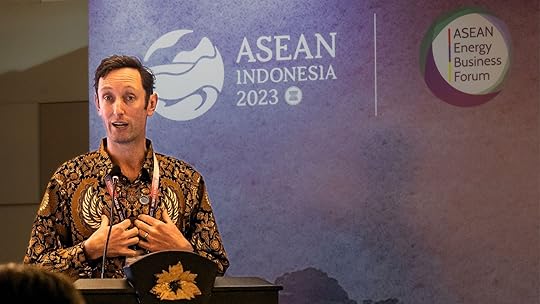 Centre for Policy Development CEO Andrew Hudson addresses the 2023 ASEAN Energy Business Forum Photo: Lucky Lontoh, IISD
Centre for Policy Development CEO Andrew Hudson addresses the 2023 ASEAN Energy Business Forum Photo: Lucky Lontoh, IISD The ASEAN Energy Business Forum (AEBF), was held in Bali on 25 August 2023 alongside the ASEAN Ministers of Energy Meeting and East Asia Summit Energy Ministers Meeting.
The Centre for Policy Development produced an event at the forum titled Investing in Energy Transition in Indonesia: Bridging the gap between Policy and Practice.
The discussion focused on identifying and removing barriers to private sector investment in Indonesian green energy projects.
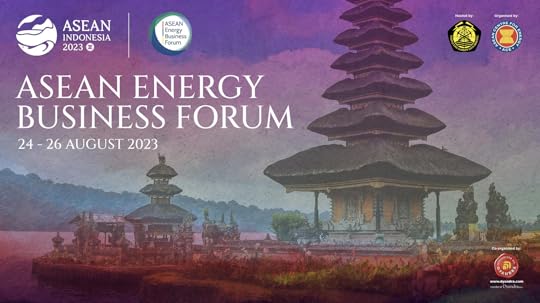
Participants included Suncable, Quantum Power Asia, Indonesian state power generator PLN, and representatives from the Indonesian Ministries of Investment, Finance, and Energy and Mineral Resources, as well as policymakers from the Balinese local government.
The event included the perspectives of private sector investors on opportunities for green energy in Indonesia, and the policy settings needed to encourage capital flows.
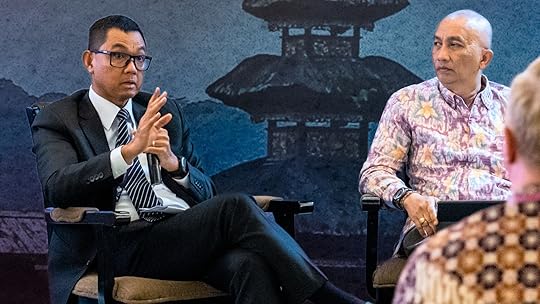 President Director of PLN, Darmawan Prasodjo (left) and The Head of Labour, Energy and Mineral Resources, Provincial Government of Bali, Bapak Ida Bagus Setiawan, at the Centre for Policy Development's ASEAN Energy Business Forum Event in Bali on 25 August 2023. Photo: Lucky Lontoh, IISD
President Director of PLN, Darmawan Prasodjo (left) and The Head of Labour, Energy and Mineral Resources, Provincial Government of Bali, Bapak Ida Bagus Setiawan, at the Centre for Policy Development's ASEAN Energy Business Forum Event in Bali on 25 August 2023. Photo: Lucky Lontoh, IISD Speakers noted that bureaucratic and regulatory barriers to investment have lowered, and discussed proposals to build on this progress.
These included measures to address market distortions created by fossil fuel subsidies and the prevalence of Take or Pay agreements leading to oversupply in the Java grid.
In responding to these concerns policymakers emphasised the importance of upgrading transmission, interconnectivity and grid integration, a key challenge in the archipelagic nation.
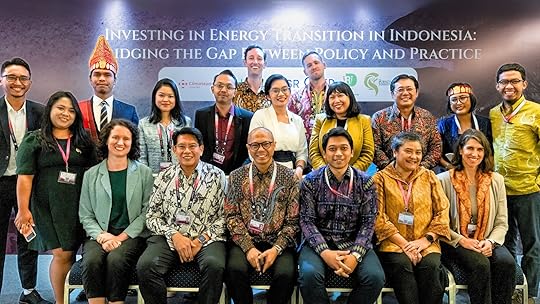 Centre for Policy Development, Climateworks Centre, and NGO partners gathered in Bali for the ASEAN Energy Business Forum
Centre for Policy Development, Climateworks Centre, and NGO partners gathered in Bali for the ASEAN Energy Business Forum Later, Centre for Policy Development CEO Andrew Hudson joined a high-level between 12 CEOS and 8 ASEAN energy ministers.
Mr Hudson and other CPD leaders met with senior officials in the Ministry of Energy and Mineral Resources.
The post ASEAN Energy Business Forum appeared first on Centre for Policy Development.
August 28, 2023
Early Childhood Development Council – 4 August 2023
The Early Childhood Development Council met for the eighth time on 4 August 2023 in Sydney.
The meeting considered the key components of system redesign needed to secure a well connected early childhood development system with universal early education and care as the backbone.
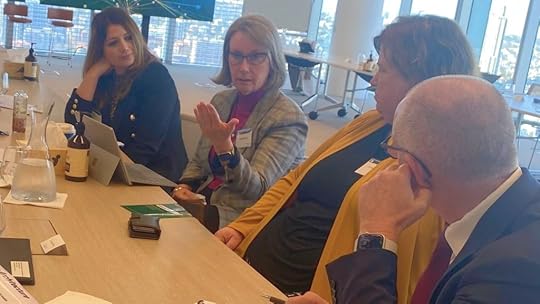
Participants discussed the momentum towards a well connected early childhood development system that was built on decades of concerted efforts by actors across the system, including many Council members.
The Council considered the critical issues that the Productivity Commission’s inquiry into early education and care had identified.
These included challenges and opportunities related to workforce supply, service quality, access, affordability, administration and public investment.
The meeting noted significant progress towards the Guarantee for Young Children and Families proposed by the Starting Better report, and emphasised the importance of universal early education and care as the backbone of a reformed early childhood development system.
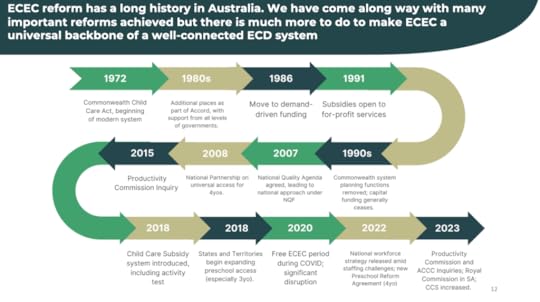
The Council also considered models of stewardship conducive to a shared approach to early childhood development, with an emphasis on the importance of clear and suitable governance arrangements for the states and Commonwealth.
Participants undertook detailed discussions on
the design of a funding system for a reformed early childhood development sector in line with the Guarantee for Young Children and Families,measures to sustain quality and workforce development to support the establishment of a universal early childhood system,measures to address market failures in early education and caresystems to provide data to track progress towards outcomes, andoverall systems architecture for an early childhood development system that delivers on the promise of the Guarantee for Young Children and Families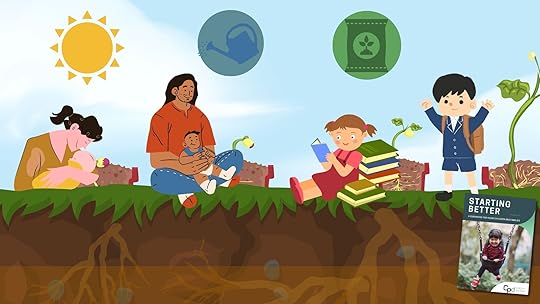 Key Documents
Key Documents
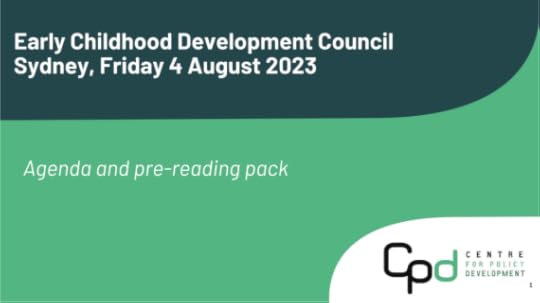 About the Early Childhood Development Council
About the Early Childhood Development CouncilThe Centre for Policy Development (CPD) convenes the Early Childhood Development Council (ECD Council). The ECD Council is an informal gathering of researchers, advocates, practitioners and policymakers in the early childhood space.
Participants attend in a personal capacity and the council has no formal standing. In line with CPD’s custom ECD Council meetings conducted under the Chatham House Rule and on an invitation-only basis to ensure those involved can participate candidly.
The post Early Childhood Development Council – 4 August 2023 appeared first on Centre for Policy Development.
A brief history of Commonwealth involvement in early childhood education and care in Australia

A Brief History of Commonwealth Involvement in Early Education and Care is a research paper produced by the Centre for Policy Development in partnership with the South Australian Royal Commission into Early Childhood Education and Care.
It was produced by CPD’s Early Childhood Development Initiative.
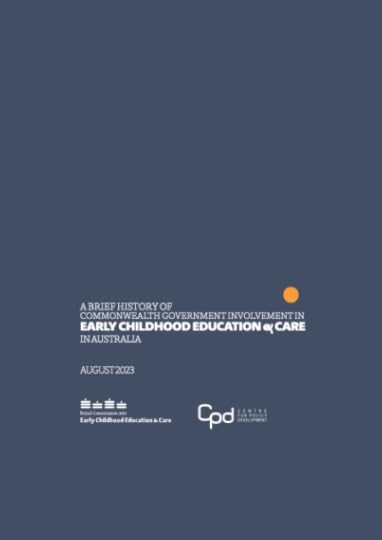 Read the Report [PDF]
Read the Report [PDF] The paper surveys the origins of today’s early education and care system, noting its divergent evolution from a private, philanthropic system into today’s pre-school and long day care systems.
Prior to 1972, long day care was provided by a mix of philanthropic and private organisations, having evolved separately to preschools (which were not considered to meet the needs of working mothers because of their shorter days). This created the ‘care’ and ‘education’ split that continues in many forms to this day.
The paper charts the evolution of Commonwealth actions across areas such as planning & access, quality & regulation, affordability & funding, workforce and the preschool system.
A Brief History of Commonwealth Involvement in Early Education and Care informed the Final Report of the Royal Commission.
The post A brief history of Commonwealth involvement in early childhood education and care in Australia appeared first on Centre for Policy Development.
August 23, 2023
MEDIA RELEASE: Intergenerational Report’s long-term wellbeing signposts
Intergenerational wellbeing that delivers inclusive opportunity requires integrated, holistic reforms
Swift climate action to limit warming also provides opportunities for long term economic progress
Investment in early childhood will deliver generational benefits as well as lifting workforce participation
Focusing on prevention and early intervention will deliver better value than remedial spending on preventable problems
Thursday 24 August 2023 – The Intergenerational Report released by Treasury today contains important signposts that the nation should heed to pursue long-term wellbeing, combat disadvantage and create opportunity for future generations, according to a leading independent policy institute.
The report makes clear the urgency of a swift, just and orderly transition to net zero carbon emissions to limit global warming to 1.5 degrees, and the cost of inaction.
It also indicates the need to seize economic and industrial opportunities in the net zero transition, which can increase Australian economic complexity and create new export industries to replace fossil fuels.
With services costs expected to rise, it’s imperative that policymakers take an integrated, preventative approach that minimises the cost of remediating health, social and environmental problems that could have been prevented with earlier intervention.
The report also demonstrates the critical importance of investing in the early years. Research – including 2021’s Starting Better report – models significant generational dividends from early childhood investment in the form of higher wages, better health, less crime, job creation and greater workforce participation.
Centre for Policy Development CEO Andrew Hudson said the report indicated the need for long-term decision making to support multi-generational wellbeing.
“It’s important to everyone in Australia that our leaders are making decisions for the long-term,” Mr Hudson said.
“This report creates a transparent, accessible baseline from today’s policy settings, incorporates known future trends and provides policymakers with an important tool in crafting reforms.
“The immediate lessons are that an integrated, holistic approach to policy and budgeting is needed to shift public spending from remediation to prevention.
“Investment in the wellbeing of future generations through a guarantee for young children and families should commence before birth and continue to school age to deliver economic, social and educational benefits that last a lifetime.
“It also makes clear that Australia must decarbonise the economy to limit otherwise enormous human and financial costs of climate change.
“It also shows that government should seize the opportunity to make an early, significant investment in green industries to secure Australia’s place in the global post-carbon economy and replace fossil fuel exports.”
ENDS
The post MEDIA RELEASE: Intergenerational Report’s long-term wellbeing signposts appeared first on Centre for Policy Development.
August 8, 2023
Lessons from Australia’s past national wellbeing approaches

Lessons from Australia’s Past National Wellbeing Approaches (PDF) is a briefing paper from the Centre for Policy Development’s Wellbeing Initiative that examines Australia’s history in relation to wellbeing economics and government. It is written by Dr Cressida Gaukroger.
It examines ABS and Treasury engagement with wellbeing, including in the Measuring Australia’s Progress project, finding they were leading instances of government engagement with more expansive and granular indicators of progress.
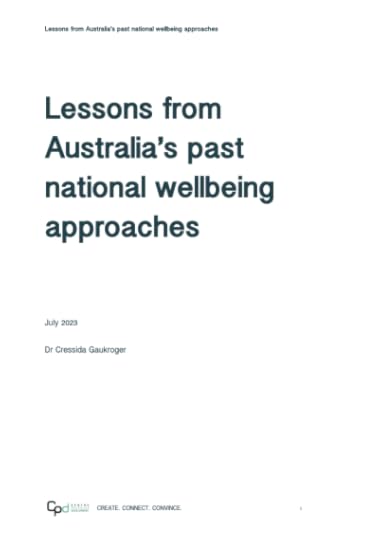
Lessons from Australia’s Past National Wellbeing Approaches identifies several lessons for contemporary policymakers. These include:
Historic approaches in Australia were largely successful despite the policy environment they inhabited being less wellbeing-literateThe importance of creating enduring cultural and practical changes for public officialsFrameworks that include clear guidance are more durable and effective than those focused on measurement aloneA public mandate for wellbeing acts as a guardrail against politicisation of the public serviceEnvironmental sustainability is an indispensable component of a successful approach DOWNLOAD THE PAPERThe post Lessons from Australia’s past national wellbeing approaches appeared first on Centre for Policy Development.
July 25, 2023
2035 Climate Initiative Roundtable Three | July 19 2023
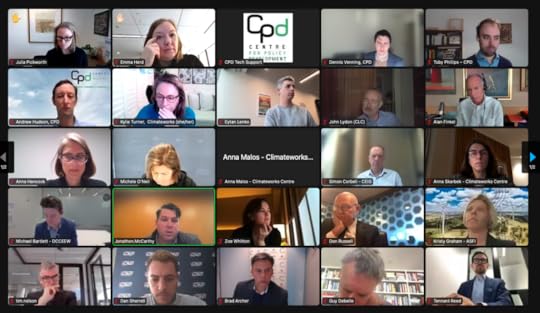
The third 2035 Climate Initiative roundtable was hosted by the Centre for Policy Development in partnership with Climateworks Centre, Pollination, ACTU and AI Group on Wednesday 19 July 2023.
It focused on ‘green industrial policy’ globally, investigating Australia’s path to developing significant clean export industries such as green steel and value-added critical minerals.
In convening the discussion we asked:
What sort of economy could Australia have in 2035 and what does it mean to become a ‘renewable superpower’?What would we need to do to achieve the ‘superpower’ ambition?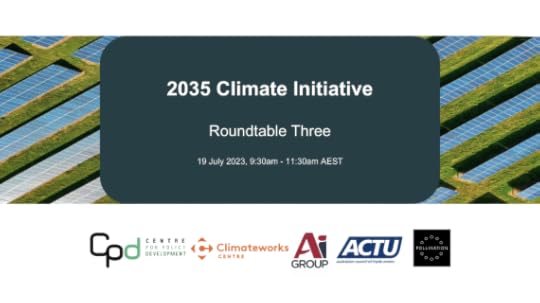
Fifty people attended the third 2035 Climate Initiative roundtable, including state and federal government officials, investors, and leaders representing businesses and workers.
They shared perspectives on future Australian contributions to clean industry in the context of global developments such as the US Inflation Reduction Act, to identify opportunities for a sustainable future Australian economy that is prosperous, diversified and resilient.
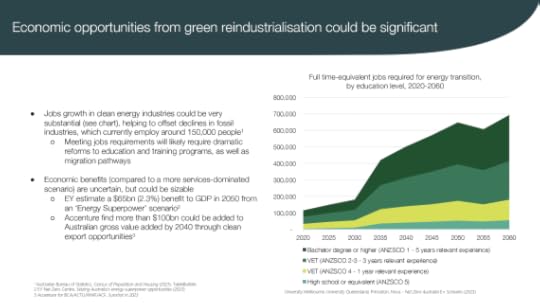
The roundtable assessed the significant opportunity for Australia, and the decisive actions required to maximise its promise. These include both policy support and step change in capital investment.
Participants highlighted the rapid pace and monumental scale of change elsewhere, and the time-bound window for action that Australia faces.
The discussion also covered the importance of near-term Australian action to contribute to global decarbonisation, including from exports such as iron ore, in which overseas emissions from processing are about double all of Australia’s domestic emissions.
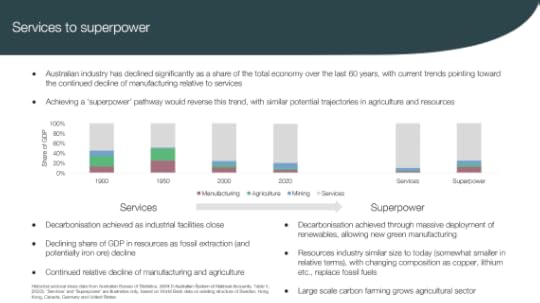
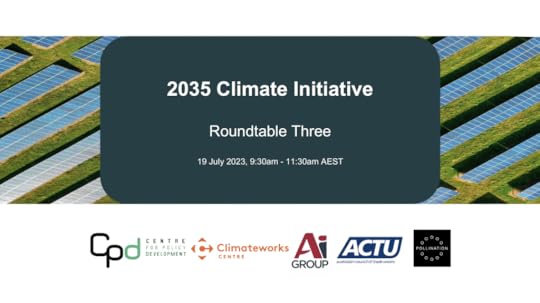
Download Participant Briefing Pack
About the 2035 Climate InitiativeThe 2035 Climate Initiative is an evolution of the Climate and Recovery Initiative (2020-2022).
We look beyond the horizon of the current decade, and identify the best ideas and opportunities for aligning Australia’s long-term economic future with climate and transition priorities. Our stakeholder roundtable series brings together trusted leaders, experts and advisers from business, regulation, policy and the community to consider the challenges and opportunities ahead.
The post 2035 Climate Initiative Roundtable Three | July 19 2023 appeared first on Centre for Policy Development.
July 20, 2023
MEDIA RELEASE: Wellbeing framework supports economy that works for people
It represents a vital upgrade from traditional economic measures
It is designed to develop over time, providing guidance to public decision-makers
Friday 21 July 2023 – Australia’s first wellbeing framework – Measuring What Matters – released today is an important component of a sustainable economy that works for people, a leading independent policy institute has said.
The framework contains five broad themes – health, security, sustainability, cohesiveness, prosperity – which draw on about 50 indicators Treasury will track.
The Centre for Policy Development (CPD) said that the framework was a vital upgrade to Australia’s economic toolkit that would provide guidance for policymakers and public officials in their decision-making.
Over the last two years, CPD’s Wellbeing Initiative has engaged closely with Australian and global efforts to align government decision-making with sustainable long-term wellbeing and shared prosperity.
Earlier this year CPD’s John Menadue Oration was delivered by Sophie Howe, inaugural Future Generations Commissioner of Wales, who provided insights from a widely acknowledged global leader in wellbeing government.
Centre for Policy Development Wellbeing Initiative Director Warwick Smith said the framework would help set Australia’s direction for the coming decades.
“Today’s announcement represents a substantial, sensible and urgent step towards a fair, sustainable national economy that works for people, communities and the environment,” he said.
“The detail and direction it provides for government decision-makers fills important gaps in traditional measures, and it will be a critical enabler of good government.
“The design allows for iteration and improvement in dialogue with the Australian people and this adaptability is an important feature of the framework.
“We look forward to its development as the conversation about Australia’s future continues.”
ENDS
The post MEDIA RELEASE: Wellbeing framework supports economy that works for people appeared first on Centre for Policy Development.
July 5, 2023
Submission to the CCA’s consultation on setting, tracking and achieving Australia’s emissions reduction targets

Our Sustainable Economy Program made a submission to the Climate Change Authority’s consultation on setting, tracking and achieving Australia’s emissions reduction targets.
The focus of this submission is on the development of CCA guidance to the Federal Government for Australia’s next Nationally Determined Contribution (NDC) for 2035. Australia’s current NDC is set at an emissions reduction target of 43% below 2005 levels by 2035 and a commitment to net zero emissions by 2050. Noting that faster decarbonisation is likely to provide a greater benefit to Australians, the submission recommends updating the NDC to set a whole-of-economy emissions target that includes:
an upper bound that is as ambitious as possible, and potentially net negativea lower bound of at least an 80% reduction on 2005 levels by 2035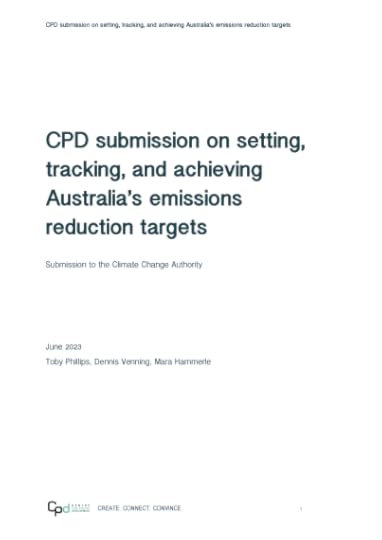 READ THE PAPER [PDF]
READ THE PAPER [PDF] It suggests that the CCA should advise the Government to commence planning for a phaseout in fossil fuel production and export. The advice on the 2035 NDC should include Australia’s possible contribution to global emissions reduction through a large clean export sector.
Touching on findings from the program’s ‘Making Our Way’ report, the submission highlights that the CCA should assess the extent to which government policy is improving the “adaptive capacity” of fossil-fuel-exposed regions, including their economic diversity, when reviewing and measuring progress.
It also advises that, to the extent possible, the CCA’s advice about future policy trajectories should recommend measures that prevent (or compensate for) any increases in the proportion of income that low-income households spend on energy.
Finally, the submission notes that current Australian government procurement does not systematically incorporate climate-related considerations at all levels. This presents a significant opportunity to drive further decarbonisation and adaptation across the economy.
The post Submission to the CCA’s consultation on setting, tracking and achieving Australia’s emissions reduction targets appeared first on Centre for Policy Development.
July 4, 2023
Submission to the Early Years Strategy

Our Early Childhood Development Initiative made a submission to the Government’s Early Years Strategy, which seeks to ‘help the Commonwealth create a more integrated, holistic approach to the early years and better support the education, wellbeing and development of Australia’s children.’ CPD’s submission highlights the unique opportunity to set out an ambitious, long-term national vision that will guide government decision-making and chart a course towards Australia being the best place in the world to be and raise a child.
The Early Years Strategy is a once-in-a-decade opportunity to be bold when it comes to what we want for current and future generations of children in Australia, with major potential social and economic benefits for children, families and society.
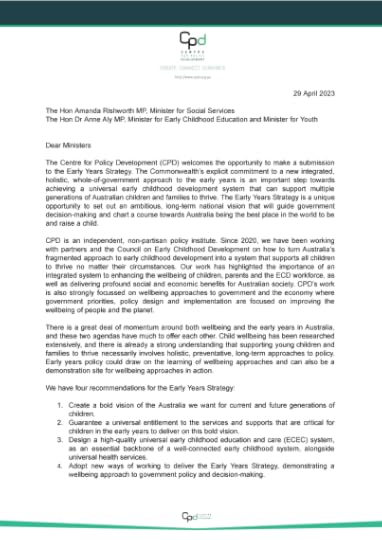 READ THE PAPER [PDF]
READ THE PAPER [PDF] The submission outlines four key recommendations for the Early Years Strategy:
Create a bold vision of the Australia we want for current and future generations of children.
The Early Years Strategy should create a bold, holistic vision for the early years, based on existing evidence of what wellbeing looks like in the early years. This requires systemic reform and collaboration between multiple levels of government, non-government organisations, and communities. The strategy should be enshrined in legislation and should ultimately serve as the overarching national framework for early childhood policy in Australia.
Guarantee a universal entitlement to the services and supports that are critical for children in the early years to deliver on this bold vision.
The Early Years Strategy should create a guarantee for every Australian child that entitles them to a suite of critical services and supports and delivers on a long-term vision of child and family wellbeing. This guarantee should look to deliver the core elements of CPD’s Starting Better guarantee including increasing paid parental leave entitlements, universal access to maternal and child health, universal access to 30 hours or three days of free or low-cost quality education and care and extra support for families to navigate the system.
Design a high-quality universal early childhood education and care (ECEC) system, as an essential backbone of a well-connected early childhood system, alongside universal health services.
High-quality, universal ECEC should be a backbone to a holistic, integrated early childhood system that can connect children to additional support, reduce the complexity of navigating services and support early detection of potential vulnerabilities. This will require proper resourcing and increased collaboration between health, ECEC and other services.
Adopt new ways of working to deliver the Early Years Strategy, demonstrating a wellbeing approach to government policy and decision-making.
Delivering on the Early Years Strategy requires new ways of working for governments to deliver on their ambition for a universal system. By taking a preventative approach to the, focusing on early intervention, and considering changes to policy indirectly related to the early years, the government can better ensure children’s ability to thrive. Integrating a wellbeing approach to the Early Years Strategy will also ensure long-term benefits and outcomes are properly considered.
The post Submission to the Early Years Strategy appeared first on Centre for Policy Development.
Centre for Policy Development's Blog
- Centre for Policy Development's profile
- 1 follower



